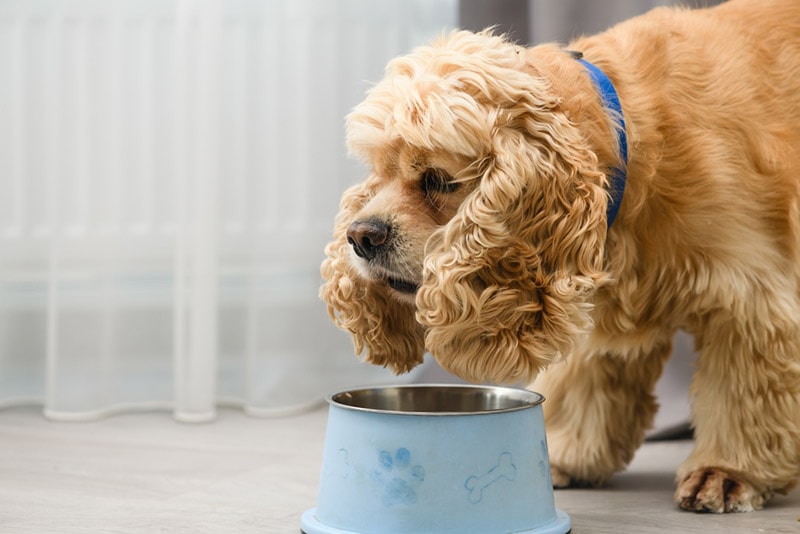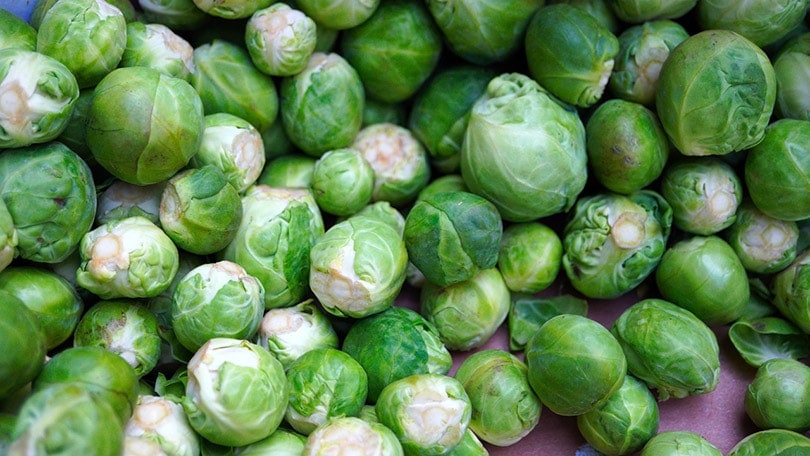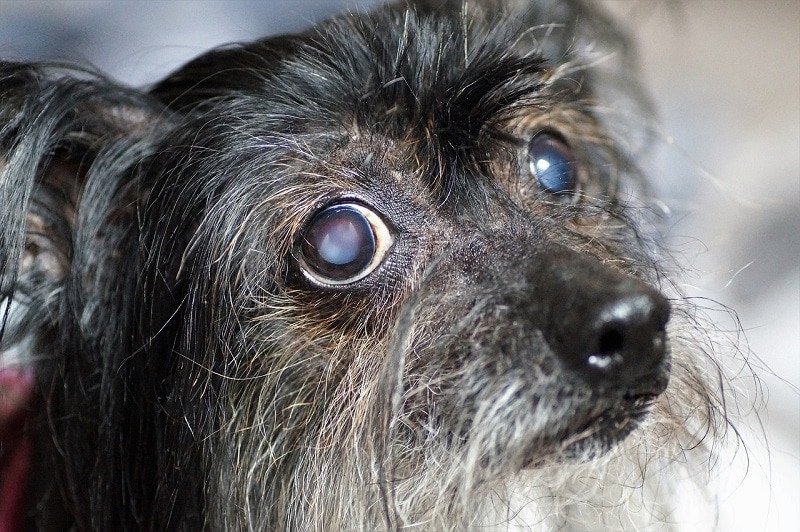Can Dogs Eat Brussels Sprouts? Vet-Reviewed Nutrition Facts & Risks
By Beth Crane
Updated on

Click to Skip Ahead
Despite their polarizing flavor, Brussels Sprouts are a staple of many fall and winter dinners! Dogs can eat Brussels sprouts safely, as long as a few precautions are taken, and they’re cooked plain. They even have some health benefits, which we’ll explore, and possible dangers you should look out for.
Are Brussels Sprouts Healthy for My Dog?
Brussels Sprouts are cruciferous vegetables that can provide a healthy dose of vitamins and minerals if fed in moderation, provided they are not cooked with anything dangerous, like onions or garlic. They contain some other not-so-beneficial substances that we’ll cover below, but some of the benefits that a couple of sprouts can give your dog are:
- Vitamin A: Vitamin A is an essential vitamin that dogs need from their diet. Vitamin A can help support vision in dogs, keep their immune systems healthy, support healthy bone growth, and help with cellular reproduction. One Brussels sprout contains a modest 7.22 micrograms of vitamin A. A cup (around 88 grams) contains 33.4 micrograms of vitamin A, and adult dogs need around 379 micrograms daily to stay healthy.
- Vitamin C: Vitamin C is a useful vitamin that acts as an antioxidant, eliminating harmful free radicals in your dog’s body that cause oxidative damage to cells. A cup of Brussels Sprouts contains around 74.8 mcg of vitamin C, but, unlike humans, dogs can also synthesize it in their livers, so there isn’t a specific recommended amount.
- Vitamin B1: Vitamin B1 (or Thiamin) is essential for a dog’s metabolic processes. Vitamin B1 helps your dog use energy and metabolize carbohydrates and also plays a part in your dog’s neuron activation. A cup of Brussels Sprouts contains 0.122 mcg of B1, providing double the recommended 0.56 mcg daily dose for dogs.
- Vitamin B6: Vitamin B6 is an important vitamin that plays a role in your dog’s bodily processes. Vitamin B6 supports healthy red blood cell production and nervous system function, helps your dog generate and use glucose (energy), regulates hormones and immune response, and helps activate certain genes. That is one useful vitamin! One cup of Brussels Sprouts provides 0.193 mcg of vitamin B6, and dogs should have around 0.4 mcg daily to stay healthy.
- Vitamin K: Vitamin K is important to help your dog’s blood clot properly. A cup of Brussels Sprouts contains 158 mcg of vitamin K, and the recommended daily intake for dogs should be 0.41 mcg.
Sprouts also contain lots of fiber that can help your dog’s digestion and stool quality. Sprouts are also a good source of potassium for dogs, which supports nerve and muscle impulses in the body. A cup of Brussels Sprouts contains a whopping 342 mcg of potassium, and dogs only need a gram a day!

The Risks of Giving Your Dog Brussels Sprouts
While there are benefits to giving your dog some Brussels Sprouts, you need to be aware of the risks. Too many Brussels Sprouts all at once can cause your dog serious discomfort; they have a reputation for causing gas for a reason!
They contain a high amount of sugar called raffinose (also found in beans). This complex sugar cannot be completely digested, so it passes into the intestine, where bacteria also breaks down food. This produces the smelly gas we associate with sprouts; even a small amount can make your dog clear the room! However, trapped wind can be extremely painful, so if you notice your dog looking bloated after eating Brussels sprouts, you may end up needing to contact your vet for help.
Too many sprouts can cause digestive upset such as diarrhea alongside flatulence, but sprouts shouldn’t cause any other effects if served plain, and in small amounts. If you’re concerned that your dog seems uncomfortable, you should contact your veterinarian; otherwise, you can rest assured that discomfort and flatulence are the only side effects your dog can get from eating plain Brussels Sprouts, as they’re non-toxic.
How Many Brussels Sprouts Can My Dog Eat?
There isn’t a recommended guideline for how many Brussels Sprouts your dog can eat, but it’s safe to say you should only feed them as an occasional treat. You should notify your veterinarian first if you plan to give your dog new foods, such as Brussels Sprouts, especially if your dog has any health concerns.
A small serving of around three Brussels Sprouts is enough for your dog to reap the health benefits without risking too much digestive upset in most cases, but always start off by introducing a small portion first to gauge your dog’s reaction!

How Can I Safely Prepare Brussels Sprouts for My Dog?
You should cook Brussels Sprouts before giving them to your pup, as they’ll be too hard to digest if given raw. Brussels Sprouts can be boiled, steamed, or baked; steaming is the best way to prepare them for your dog since they retain the most nutrients. Make sure you only serve Brussels Sprouts to your dog if they’re plain and unseasoned.
Many people enjoy their Brussels sprouts cooked with butter and bacon, presumably because this stops them tasting of sprouts and makes them taste of butter and bacon! But this tasty modification should never be served to your dog as it will likely cause digestive problems such as diarrhea and vomiting due to the higher fat content. This is particularly important for dogs on a diet or those with health problems such as pancreatitis.
Never serve your dog Brussels Sprouts if they’ve been cooked with onions or garlic, as these allium plants are toxic to dogs even in small amounts and can cause serious illness if ingested.
Cutting the Brussels Sprouts into bite-sized quarters can prevent choking (particularly in smaller dogs). Make sure to wash the spouts thoroughly before cooking them for your pup, and don’t serve the tough stems if you have them.
Final Thoughts
Brussels Sprouts are a healthy treat for your dog in moderation, and they provide several vitamins and minerals. Cooking a few Brussels Sprouts as a treat can benefit your dog as long as they’re plain, but avoid giving them too many because Brussels Sprouts contain sugar that causes lots of gas!
Too many sprouts can cause excessive flatulence, digestive upset, and diarrhea, and sticking to around three per serving maximum is best. Always confirm that any new foods are okay to give to your dog before serving them since they may be unsuitable for dogs with certain medical conditions.
Featured Photo Credit: Free-Photos, Pixabay













